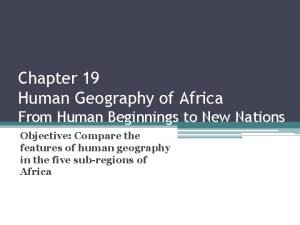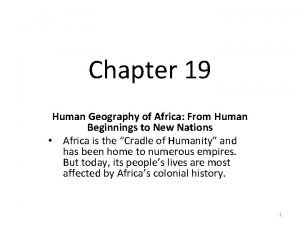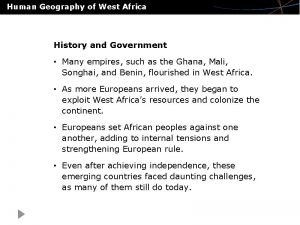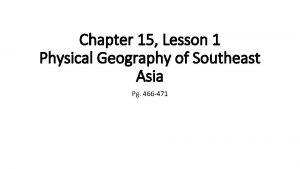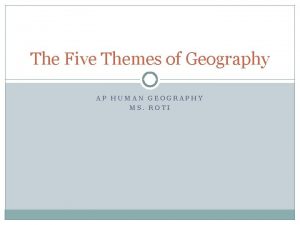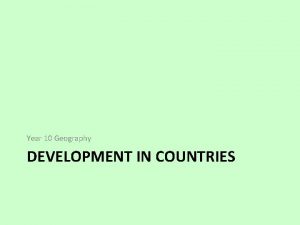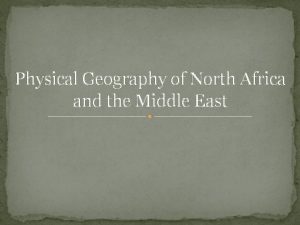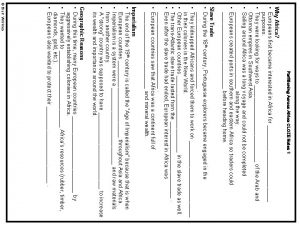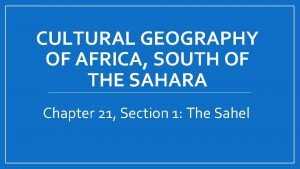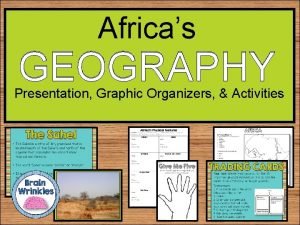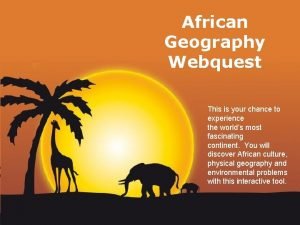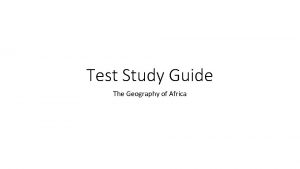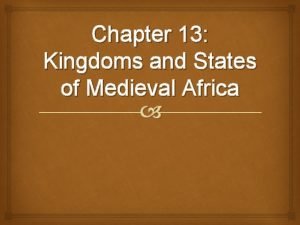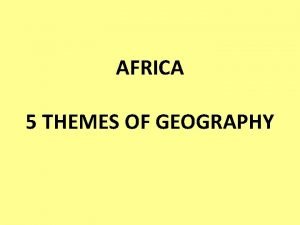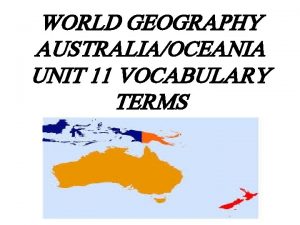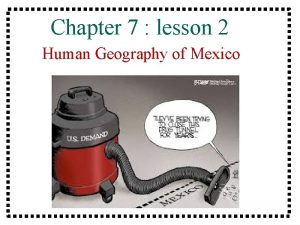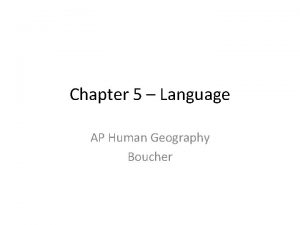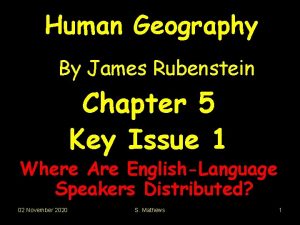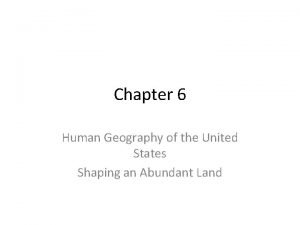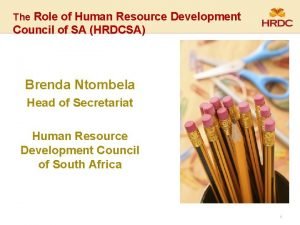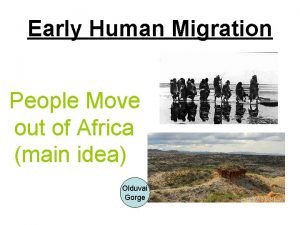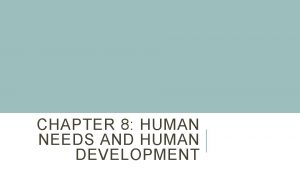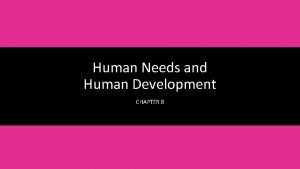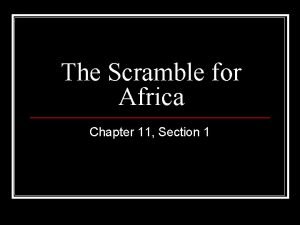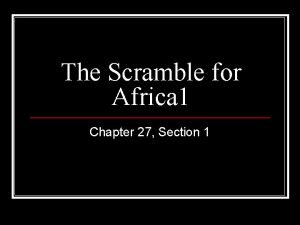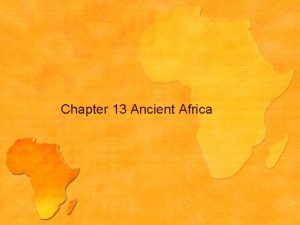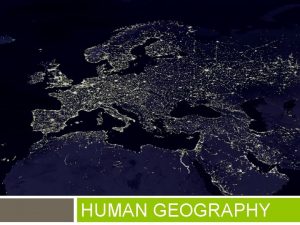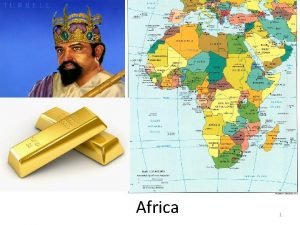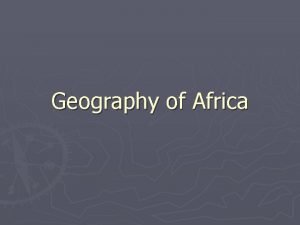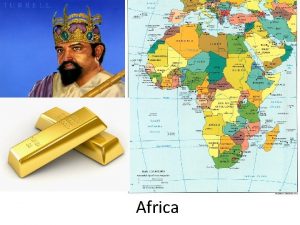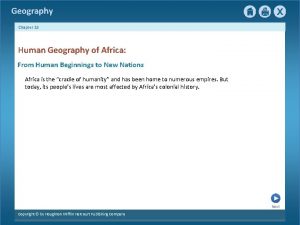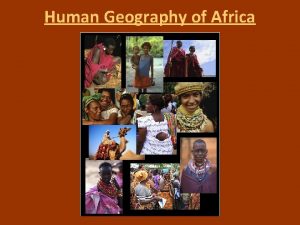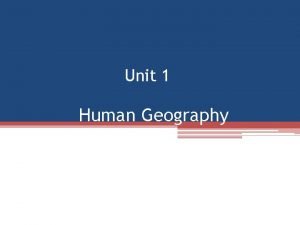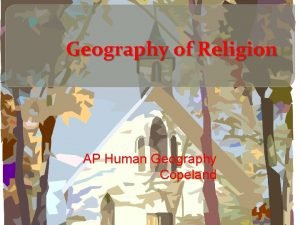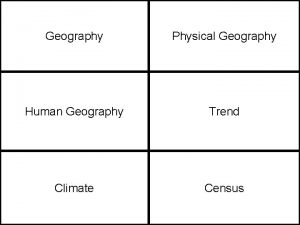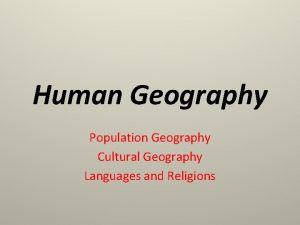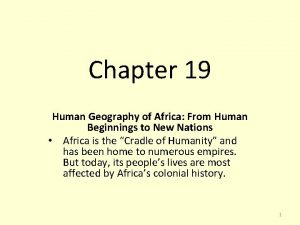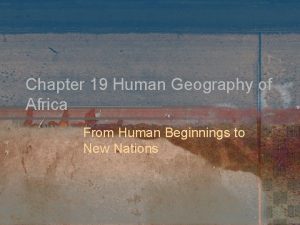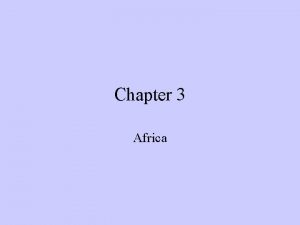Chapter 19 Human Geography of Africa From Human



































- Slides: 35

Chapter 19 Human Geography of Africa From Human Beginnings to New Nations

Section 1 - East Africa • East Africa- Where the worlds first humans are believed to have lived – East Africa has a large number of prehistoric human remains

Section 1 - East Africa • Early Civilizations– Aksum- powerful trading civilization from circa. 100 -1100’s A. D. • Crossroads of major trading routes & civilization • Persian Gulf decline?

Section 1 - East Africa • Colonization– Berlin Conference-!!!! 1884 -85 • • • Europeans did not want to fight each other 14 nations Rules for dividing Africa No African rulers were invited By 1914 only Liberia & Ethiopia were free from European control.

Section 1 - East Africa – Nations just had to show that they could control the area to have ownership – No regard to where ethnic or linguistic groups lived. • Caused major problems – Civil Wars, Genocides • By 1970’s most countries were independent – Ethiopia remained free by buying modern weapons from France & Russia

Section 1 - East Africa • East Africa- relies heavily on farming – Cash Crops- crops grown for direct sale • Coffee, tea, & sugar. • Reduces amount of land available for farmland • Can be risky?

Section 1 - East Africa • Tourism– Game Reserves bring in millions of dollars from tourism. • Today farmers want the land to make a living

Section 1 - East Africa • Cultures of East Africa– Masai- farmers & herders of East Africa • Live on the grasslands of the Great Rift Valleys

Section 1 - East Africa • Health Concerns– AIDS has become a pandemic in East Africa • Uncontrollable outbreak of a disease, affecting a large population over a wide geographic area. • Some governments try to hide the AIDS problem.

Section 2 - North Africa • Carthage- great city of ancient Africa – Gladiator?

Section 2 - North Africa • Ancient Egypt– Expanded around the Nile River – Lasted over 2600 years – Egyptian medicine was famous throughout the ancient world

Section 2 - North Africa • Islam– Major cultural and religious influence in North Africa – Mostly spread through conquest & trade.

Section 2 - North Africa • Black Gold– Most North African countries economies are based on oil first, then farming & mining second.

Section 2 - North Africa • North Africa is a combination of Arabic influences & traditional African ethnic groups.

Section 2 - North Africa • Souks- North African market-place – Usually located in the medina of a North African city or old section • Bargaining, bartering, & haggling for goods

Section 2 - North Africa • Rai- Algerian music developed by 1920’s poor urban children. – Rebellious music

Section 2 - North Africa • Life is generally centered around the males. – Few women work after marriage – Generally eat & pray separately

Section 3 - West Africa • Don’t Write- Many great societies & trading routes came through West Africa

Section 3 - West Africa Mali Empire • Trading Empires– Empires of Ghana (meaning war chief), Mali, & Songhai, were great trading empires • Mainly based on gold & salt trade Songhai Empire Ghana Empire

Section 3 - West Africa • Stateless Society- society in which people rely on family lineages to govern themselves instead of elected officials – Before colonialism

Section 3 - West Africa • Ashanti- people of Ghana – Famous for their colorful weavings that are known as Kente cloth.

Section 4 - Central Africa • Bantu- central African peoples who migrated from central to southern Africa. – Known as the Bantu Migrations • Many Africans speak some form of Bantu

Section 4 - Central Africa • Slave Trade- European rulers wanted slaves for their plantation farms – African rulers would trade potential slaves for guns & other goods. – Millions were shipped off – 20% died en route

Section 4 - Central Africa • Colonialism- started with King Leopold III of Belgium in early 1880’s – Wanted to exploit the region for economic gain.

Section 4 - Central Africa • Effects of Colonialism– Centralized governments with lots of corruption – No regard for tribal boundaries – Loss of resources – Cultural & ethnic oppression – Little or no infrastructure – Little or no education

Section 4 - Central Africa • Democratic Republic of the Congo– 1 st leader- Mobutu Sese Seko 1967 -97 • Took kickbacks from economy • Used army to maintain power – Rich in natural resources (diamonds, gold, copper…) yet still poor

Section 4 - Central Africa • African Art. Fang sculpture • The Fang peoples live in Central Africa – Wooden carvings • Usually masks painted white & facial features outlined in black.

Section 4 - Central Africa • Education challenges– Lack of teachers, & schools – High dropout rate – 700+ languages spoken in Central Africa

Section 5 - Southern Africa • DON’T WRITE • Southern Africa culture is a blending of African cultures, colonialism, & goldtrading empires.

Section 5 - Southern Africa • Gold Trade Empires– Great Zimbabwe • Capital of great goldtrading empire from 1200 to 1400 – Mutapa Empire • Another great goldtrading empire from 1450 to the 1500’s when Europeans arrived

Section 5 - Southern Africa • The Boers- the Dutch moved into South Africa to be farmers. – Their descendents became known as Afrikaaners – Strong supporters of Apartheid

Section 5 - Southern Africa • Apartheid- South Africa’s policy of complete separation of the races – Banned social contact between blacks & whites

Section 5 - Southern Africa – Established separate neighborhoods, & schools – Blacks were 75% of population, yet received little land to live on

Section 5 - Southern Africa • Nelson Mandela- emerged as one of the leaders of the African National Congress (ANC) in 1949 – Led struggle to end apartheid – Imprisoned for 27 years – Later became S. Africa’s president

Section 5 - Southern Africa • Many countries of South Africa are growing economically – Yet there is a tremendous division of wealth between blacks & whites. Johannesburg
 Chapter 19 human geography of africa
Chapter 19 human geography of africa Human geography of africa
Human geography of africa Human geography of west africa
Human geography of west africa Chapter 15 lesson 1 physical geography of north africa
Chapter 15 lesson 1 physical geography of north africa Ap human geography political geography frq
Ap human geography political geography frq 5 themes of geography ap human geography
5 themes of geography ap human geography Stateless nation
Stateless nation Gni definition ap human geography
Gni definition ap human geography Physical features of the middle east map
Physical features of the middle east map Partitioning across africa cloze notes
Partitioning across africa cloze notes Africa geography unit test study guide
Africa geography unit test study guide Africa south of the sahara map
Africa south of the sahara map Label the following
Label the following Geography webquest
Geography webquest Africa geography unit test study guide
Africa geography unit test study guide Medieval africa geography
Medieval africa geography 5 themes of geography africa
5 themes of geography africa Medieval africa geography
Medieval africa geography North africa and southwest asia physical geography
North africa and southwest asia physical geography Locate the sahara and the sahel. label them on your map
Locate the sahara and the sahel. label them on your map Ap human geography chapter 11 vocab
Ap human geography chapter 11 vocab Chapter 16 ap human geography
Chapter 16 ap human geography Chapter 22 human geography of southwest asia
Chapter 22 human geography of southwest asia Chapter 11 ap human geography
Chapter 11 ap human geography Chapter 7 lesson 2 human geography of mexico
Chapter 7 lesson 2 human geography of mexico Dispersal ap human geography
Dispersal ap human geography Chapter 13 human geography of europe
Chapter 13 human geography of europe Chapter 5 key issue 1 ap human geography
Chapter 5 key issue 1 ap human geography Why is the united states called a postindustrial economy
Why is the united states called a postindustrial economy Chapter 25 section 3 nepal and bhutan
Chapter 25 section 3 nepal and bhutan Human resource development council of south africa
Human resource development council of south africa Human migration out of africa
Human migration out of africa Human needs and human development
Human needs and human development Chapter 8 human needs and human development
Chapter 8 human needs and human development Chapter 11 section 1 the scramble for africa answer key
Chapter 11 section 1 the scramble for africa answer key Chapter 27 section 1 the scramble for africa
Chapter 27 section 1 the scramble for africa
